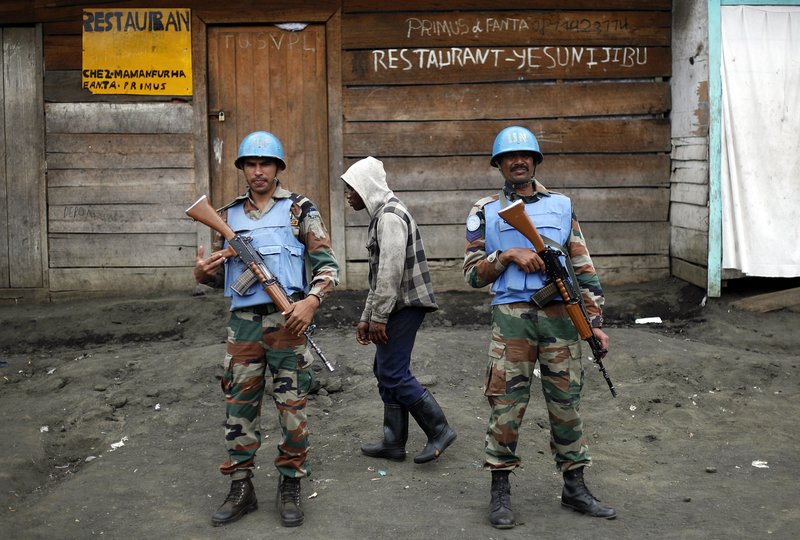KINSHASA, Congo -- In the deadliest single attack on a United Nations peacekeeping mission in nearly 25 years, rebels in eastern Congo killed 15 peacekeepers and wounded 53 others in an attack on their base that began at nightfall and went on for hours.
U.N. Secretary-General Antonio Guterres expressed "outrage and utter heartbreak" and called the attack a war crime, urging Congolese authorities to swiftly investigate. The U.S. State Department's Bureau of African Affairs said it was "horrified."
It was the deadliest attack on a U.N. peacekeeping mission since June 1993, when 22 Pakistanis were killed in Somalia, a U.N. spokesman said.
The peacekeepers killed Thursday were from Tanzania, and President John Magufuli expressed his shock and offered prayers for the wounded. At least five Congolese soldiers also were killed in the attack Thursday evening that has been blamed on one of the region's deadliest rebel groups.
Three peacekeepers remained missing, the U.N. said. More than 20 were evacuated for medical treatment in the regional capital, Goma.
It was not clear when military reinforcements arrived after the attack, the U.N. said. Conditions in the region are "very, very challenging," said U.N. peacekeeping chief Jean-Pierre Lacroix, who said the attack followed a recent increase in activities by various armed groups. He called the attack a response to the U.N. mission's own "increasingly robust posture."
"We are disturbing them," he said. "They do not like it."
The peacekeeping base is about 27 miles from the town of Beni, which has been repeatedly attacked by the Allied Democratic Forces rebel group, which is suspected in Thursday's attack. The base is home to the U.N. mission's rapid intervention force, which has a rare mandate to go on the offensive against armed groups in the vast, mineral-rich region.
The U.N. mission in Congo is the largest and most expensive in the world, and it has been a high-profile target of cost-cutting efforts under President Donald Trump's administration. Nearly 300 peacekeepers have been killed since the mission arrived in 1999, according to U.N. data. The mission has a budget of $1.14 billion and over 16,500 soldiers.
Congo, the size of Western Europe, has seen immeasurable cruelty and greed as a result of its mineral resources while more than 80 percent of the population lives below the absolute poverty line of $1.25 a day. The nation suffered one of the most brutal colonial reigns ever known before undergoing decades of corrupt dictatorship. Back-to-back civil wars later drew in a number of neighboring countries.
Many rebel groups have come and gone during the U.N. mission's years of operation, at times invading the regional capital.
One of the greatest threats now comes from the Allied Democratic Forces. While the fighters are mainly Muslim, experts say there are no proven links between the rebels and other extremist organizations in Africa.
The Allied Democratic Forces "has an agenda both ideological and extremist in nature but also focused ... on exploitation of illegal resources," Lacroix said. He accused the rebels of preying on the local population.
The rebels once aimed to overthrow President Yoweri Museveni's government in neighboring Uganda. By the 1990s, they had established themselves in Congo.
The Allied Democratic Forces intensified attacks several years ago, and human-rights groups say at least 1,000 people have been killed in the past three years. About a dozen of the rebels have been sentenced to death on charges related to participating in an insurrection movement.
The U.N. mission in 2006 helped carry out Congo's first free and fair elections in 46 years, but since then the winner of that vote, President Joseph Kabila, has become further entrenched. Anger has grown as presidential elections originally set for late last year have been repeatedly delayed. The government has blamed insecurity as a factor.
The U.N. secretary-general in October warned that without real progress toward the elections, Congo "is likely to enter a period of extreme volatility."
Information for this article was contributed by Al-Hadji Kudra Maliro of The Associated Press.
A Section on 12/09/2017
